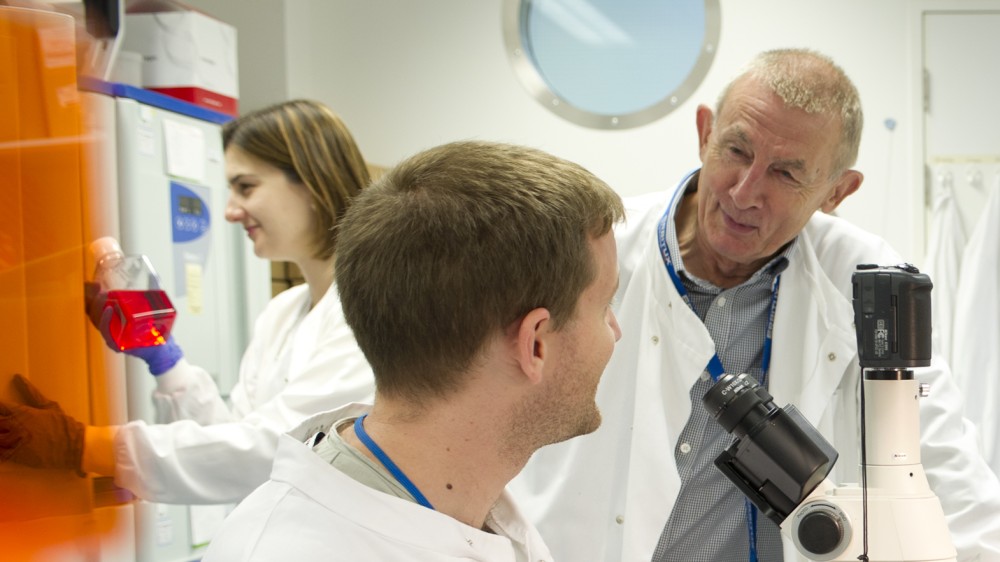Ten new PhD studentships announced

We have committed over £1M towards the development of non-animal methods.
NC3Rs PhD studentship projects aim to produce well-characterised non-animal methods that are more reliable, predictive or reproducible than existing approaches whilst embedding the 3Rs principles in training the next generation of researchers. Alongside their research projects, the students benefit from tailored training opportunities to support them in achieving a successful PhD and building their skills to aid a future career in the research ecosystem.
This year’s projects include a range of technologies from complex in vitro models, such as microphysiological systems and organoids, to computational models incorporating machine learning. These models may be novel or combine existing technologies to apply to new scientific questions with the aim of replacing the use of animals in research. For example, Professor Beata Wojciak-Stothard was awarded funding to focus on characterising an organ-on-chip model to replace the use of mice, rats and guinea pigs in some studies of chronic obstructive pulmonary disease research. Once characterised this model could have further applications, replacing the use of animals in other lung diseases such as asthma. A project supervised by Dr Amanda-Jayne Carr aims to replace studies using rodents for age-related macular degeneration by creating a cell-based model to screen drugs.
Details of two additional awards being made with the British Heart Foundation will be published upon ratification of the awards early in 2025.
NC3Rs PhD studentship awards are made directly to the principal supervisors. Interested students should contact the respective supervisors.
Studentship awards 2024
Using a defined 3D human organoid model to replace the use of animals in the screening and evaluation of treatments for prostate cancer – Dr Adriana Buskin, Newcastle University (36 months).
Aim: Characterise an animal-free iPSC-derived human organoid model that replicates early stage disease and demonstrate its utility to replace the use of mice in screening treatments for prostate cancer.
Mature human iPSC-derived atrial cardiomyocytes to replace animals in the study of atrial fibrillation – Dr Patrizia Camelliti, University of Surrey (48 months).
Aim: Develop methods to culture structurally and functionally mature iPSC-derived cardiomyocytes enabling atrial fibrillation to be modelled in vitro, increasing the number of studies where animals can be replaced in cardiovascular research.
Developing an in vitro model to investigate the role of the immune system in age-related macular degeneration – Dr Amanda-Jayne Carr, University College London (36 months).
Aim: Develop an in vitro model using human iPSC-derived cells to represent the retinal pigment epithelium and immune cells, two key cell types involved in age-related macular degeneration, replacing the use of rodents in some studies of this disease.
Development of 'human stroke-on-a-chip' model to replace rodent stroke models – Dr Hilary Carswell, University of Strathclyde (36 months).
Aim: Further develop a microfluidics model of stroke by adapting it to use human iPSC-derived neuronal cells replacing embryonic rodent neuronal cultures currently needed for the model.
Combining machine learning and human skin explant models to harness beneficial skin microbes to treat atopic dermatitis – Dr Thomas Clarke, Imperial College London (36 months).
Aim: Replace the use of mice models in studies investigating therapeutic options for atopic dermatitis by using mathematical modelling and machine learning tools combined with human skin biopsies to identify resident microbes with therapeutic potential.
Multi-omic analysis of human poor risk acute myeloid leukaemia to replace xenotransplantation assays and expand leukemic stem cells – Dr William Grey, University of York (48 months).
Aim: Identify biomarkers with multi-omics datasets that predict whether patient samples of acute myeloid leukemic stem cells are usable without transplantation into animals and develop in vitro culture conditions that maintain stem cell function.
Validating methods to cryopreserve, store and revive human precision cut tissue slices for disease modelling and drug testing – Professor Fiona Oakley, Newcastle University (36 months).
Aim: Characterise the use of human precision cut tissue slices to replace rodent models in fibrosis disease modelling, drug screening and toxicity testing and generate banks of prepared, characterised and cryopreserved tissue for “on-demand” use.
Developing patient derived tumour organoids to replace mouse models in understanding and improving anti-tumour T cell responses – Dr Emma Reeves, University of Southampton (36 months).
Aim: Develop a co-culture method using patient-derived T cell and tumour organoids to replace the use of mice in some immunotherapy efficacy studies.
Human sensory neuron and macrophage co-culture; developing a model to test agents capable of disrupting painful neuroimmune signalling – Dr Greg Weir, University of Glasgow (48 months).
Aim: Demonstrate the utility of the first human co-culture method of iPSC-derived sensory neurons and macrophages to replace rodent use in neuropathic pain research and screening of potential therapeutics.
Organ-on-a-chip modelling of respiratory-vascular cell-cell communication in Chronic Obstructive Pulmonary Disease (COPD) – Professor Beata Wojciak-Stothard, Imperial College London (36 months).
Aim: Characterise the first combined respiratory and vascular system organ-on-chip model to replace the use of rodents in some studies of COPD.
